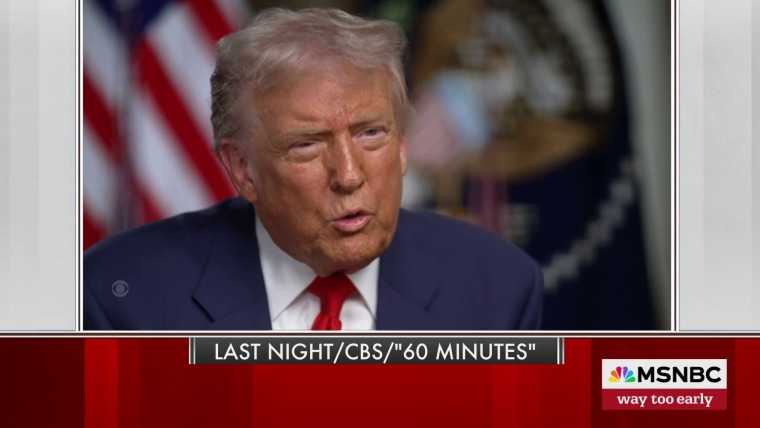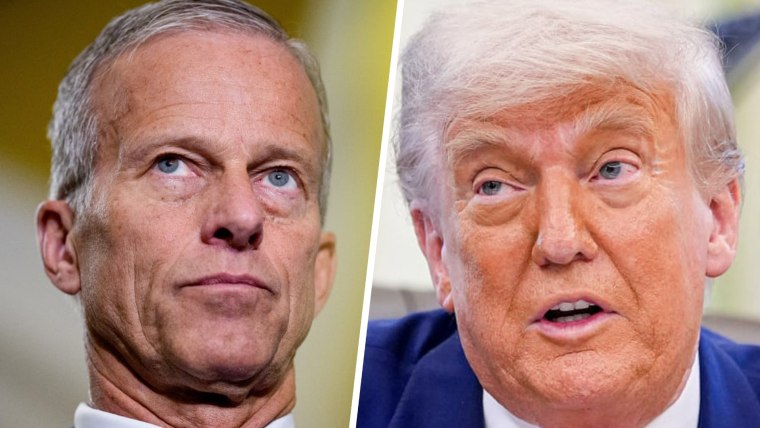At 36 days, and counting, this is now the longest federal shutdown in U.S. history. While setting this inauspicious record, the GOP-controlled Congress has left hundreds of thousands of federal workers missing paychecks, even as roughly 40 million people are now struggling to feed themselves and their families.
Johnson’s strategy to hinder any chance for Democrats to win concessions is reaching its breaking point.
The House of Representatives has been dormant for even longer — the chamber last held a vote on Sept. 19 — as Speaker Mike Johnson has scattered its members to their districts. But with the shutdown’s policy consequences pressing in on lawmakers, the strain is beginning to show. The first real hints of a deal to reopen the government appeared in the Senate earlier this week. Although at this point the Senate has more of a concept of a plan than a full framework, Johnson’s strategy to hinder any chance for Democrats to win concessions is reaching its breaking point.
The next moves could determine whether 22 million Americans staring down a massive health insurance premium hike will be reprieved or if the pain of the past six weeks has been for naught.
More than two weeks before federal funding lapsed on Oct. 1, Johnson ushered a “clean” continuing resolution through the House. The short-term funding bill would instruct federal agencies to continue operating at the same funding levels the GOP set earlier this year. Once it was delivered to the Senate, Johnson sent the House on recess. His plan — in addition to avoiding a vote on the Epstein files — was to pressure Senate Democrats to accept the House bill as written. If they did not, Johnson thought, Democrats would take the blame for the resulting shutdown.
But that’s not how this has played out. The most recent polling shows voters continue to blame President Donald Trump and Republicans more than Democrats for the shutdown. And Johnson can’t wait out the Democrats indefinitely. The bill that passed the House only funded the government through Nov. 21, a deadline that is now too close to be viable. Any bill to reopen the government for longer requires a fresh vote in the House, necessitating their return to Washington.

It would seem then that Democrats should increase the pressure on Senate Majority Leader John Thune, R-S.D., as the House bill — which has now failed to advance to the floor 14 times now — becomes more obsolete by the day. But a group of centrist Senate Democrats are looking for a way out in behind-the-scenes negotiations with their GOP counterparts. NBC News reported that some senators are even feeling optimistic that the shutdown could end before the week is out.
Here’s how “multiple Senate aides” described the potential deal to MSNBC congressional reporter Kevin Frey:
Lawmakers would advance a so-called ‘mini-bus’ — funding the Department of Agriculture, the Department of Veterans Affairs, military construction and the legislative branch — alongside a short-term funding bill reopening the rest of the government. In exchange for that bill passing, Democrats would get a separate vote on extending the enhanced subsidies for Obamacare.
There are still a lot of details to iron out in the bill that would get the separate vote, including how long the extension would last and whether the subsidies would still be as widely available. Regardless, though, this arrangement doesn’t achieve Democrats’ stated goal for this shutdown since it began: saving the expiring subsidies. A separate vote, even one guaranteed by an agreed upon date as Punchbowl News reported is under discussion, only promises a lot of effort to shape a bill that could still ultimately go nowhere.
A doomed vote does not seem to be a concession worthy of ending the shutdown.
In fact, Thune said Tuesday that any vote for the extensions under discussion would require 60 votes to pass. “Honestly, think about what the Democrats are asking us to do here,” he told reporters. “They’re saying it’s going to take 60 just to fund the government, but we want to have a vote on a massive sort of piece of health care legislation at 51.” The odds of hitting the 60-vote threshold, absent a substantial commitment from Thune to provide the 13 additional Republican senators needed to overcome a filibuster, seem slim.
Such a (hypothetical) vote would at least get GOP senators on record as proactively choosing to axe health care subsidies. But a doomed vote does not seem to be a concession worthy of ending the shutdown. It’s still anathema to most Republicans to be seen bolstering Obamacare, even if many of their constituents benefit from the law. As Frey reported, many liberal Democratic senators are understandably skeptical of the idea of throwing in the towel in favor of a moral victory.
Further, by decoupling the subsidies issue from the shutdown itself, the impetus for House Republicans to address the issue at all but evaporates. Even if by some bit of providence the Senate passes a compromise on the subsidies, there are few ways to force Johnson to bring that bill to the House floor. The only way to guarantee that the subsidies survive is to include an extension in either the short-term or long-term funding bills directly.
Johnson told reporters Tuesday that he’ll call the House back in session once the Senate has moved to reopen the government. He’s also stated that he’s opposed to a short-term bill that lasts only through mid-December, skirting the traditional pressure the holidays provide to force lawmakers to craft a deal. If he gets his wish and can fund the government until January, it becomes even less likely that any Senate-crafted compromise makes its way to President Trump’s desk.
The speaker has already shown himself willing to effectively dissolve the House rather than negotiate in good faith with Democrats. There should be no reward, no easy path to victory, for shuttering the lower chamber when millions are crying out for help from their representatives. When Johnson finally is forced to bring the House back into session, he must be confronted a deal too firmly entrenched within the resulting bill to dislodge or ignore.

